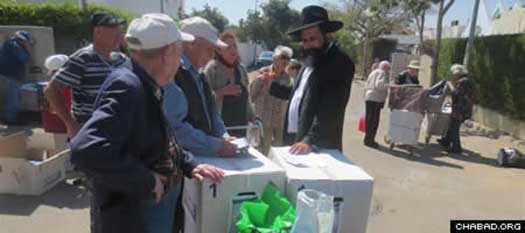
Food Assistance Provided Throughout Israel
When Rabbi Schneur Zalman of Liadi founded Colel Chabad in 1788 to help the needy in the land of Israel, Passover assistance was one of the first priorities. With the holiday rapidly approaching, the charity is working hard again this year to provide assistance to more than 17,000 families and individuals throughout the country.
“The logistics start months before, with packing beginning immediately after Purim,” explains Rabbi Tzvi Blau, who directs the distribution with the assistance of all departments of Colel Chabad. “In all, we distribute roughly 25 tons of matzah, 260 tons of vegetables and 60 tons of chicken to more than 70 cities, towns and villages throughout Israel. Wherever possible, local volunteers provide home delivery; elsewhere, the recipients pick up their packages from the town center,” he says.
The price tag for the food comes to an impressive $2.1 million to various destinations. Five hundred widows and orphans receive aid through Colel Chabad’s Chesed Menachem Mendel Orphan Fund, including financial support, food baskets and vouchers for clothing. Two thousand Holocaust survivors will receive assistance from Colel Chabad in conjunction with the Claims Conference, established in 1951 to obtain compensation from the German government for Jewish victims of Nazi persecution.
In addition, between 7,000 and 8,000 needy families are referred to Colel Chabad for Passover goods via Israel’s social service agencies. Colel Chabad delivers the packages to the relevant communities, whose municipalities and local charities distribute them. This happens with the help of the Fellowship Fund, under the supervision of Rabbi Yechiel Epstein.
Needy families throughout Israel are given packages for Passover consisting of two boxes of dry goods, including shmurah matzah; cleaning materials; disposable plates and other items; and matzah meal. They also receive carrots, onions and potatoes. Some get a case of chickens, while others, depending on the community, get a voucher to purchase chickens from a local supermarket. The value of the packages is nearly $200 per family.
Colel Chabad in Ashkelon has both a soup kitchen and a center for the elderly. Last week nearly 400 survivors of World War II received Passover assistance in Ashkelon and on March 21, 300 survivors received Passover assistance. In broken Yiddish, Shlomo shares a bit of his story while waiting for a lift to take his package home. Shlomo is 91 years old and originally from Ukraine. Before the war, he says he attended synagogue regularly before being recruited into the Soviet army. After the war he returned to Ukraine where he lived until 1995, when he made moved to Israel with his wife, who passed away two years ago.
Shlomo has two sons living in Ashkelon, along with grandchildren and great-grandchildren. He says that his children assist him when possible during the year, but during the holidays, he receives assistance from Colel Chabad. “I am grateful for the assistance from Colel Chabad. I attend the center every day for prayers and look forward to learning with Rabbi Chaim Atias after prayers. I will be attending the Passover seder with Chabad,” says Shlomo.
Almost 150 Chabad houses in Israel hosted communal Sedorim this year with local centers contributing 10 percent of the total expense of such meals, with the balance subsidized by Colel Chabad.
Seders are most often attended by seniors, elderly immigrants, new immigrants, and needy and single families; they get a dinner consisting of fish, salads, meat, matzah and beverages. Chabad-Lubavitch emissaries provide the venue, tables and chairs, and Haggadahs.
Twenty of the many Colel Chabad soup kitchens throughout Israel also held Sedorim for those who regularly receive meals there. These kitchens stay open the entire holiday, providing kosher-for-Passover meals to their constituents.
“Passover assistance, though one of the first projects established by Colel Chabad, is just one of dozens of Colel Chabad projects throughout Israel that address the needs of the disadvantaged and helpless,” says Rabbi Menachem Traxler.
“For nearly 225 years,” he continues, “Colel Chabad has been doing one thing, and one thing only—providing meaningful material help to Israel’s poorest, regardless of age, gender, ethnicity or degree of religious observance.”











